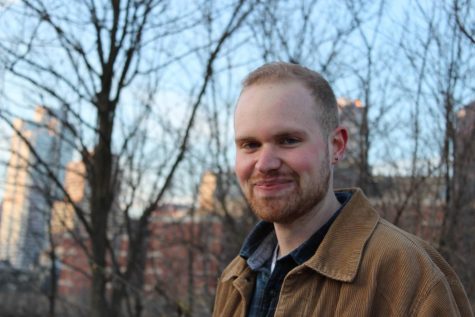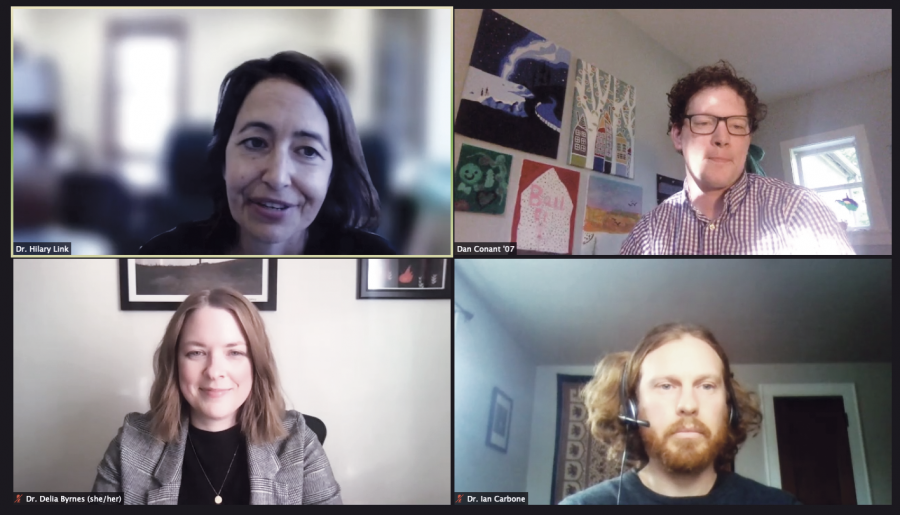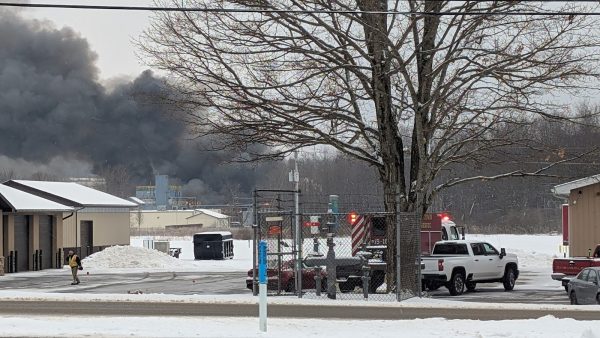Link’s Lecture series continues
President Hilary Link hosted “A Conversation on Social and Environmental Justice,” the second lecture in her series on social justice Wednesday evening via Zoom.
The panelists included Dan Conant, ’07, the founder and CEO of Solar Holler, a West Virginia-based solar panel company committed to making solar panels more affordable. Visiting Assistant Professor of Environmental Science and Sustainability Delia Byrnes and Assistant Professor of ESS Ian Carbone were also panelists.
The panel began discussing whether renewable energy is always better than fossil fuels. Conant argued that renewables are usually better, but the issue is where to put renewable energy products.
“We need to make sure people are benefitting and towns are benefiting,” Conant said.
Carbone explained the challenges of setting up renewable plants, including spatial issues, the intermittent production of solar energy due to varying sunlight and the challenges to improving the electrical grid for renewable resources. He also noted that many people are unable to afford solar panels.
Byrnes emphasized the need to look at the renewable energy transformation in terms of political, social and environmental systems.
“If we approach energy transition as an opportunity to reimagine what it means to be in community and in good relations, to borrow a term from Indigenous scholars, then renewable energy can really have the potential to create a more sustainable future for everyone, ” Byrnes said.
The discussion turned into exploring ways in which low-income communities can afford solar energy. Carbone explained that communities could co-own solar technology and that the government should subsidize solar to make it more affordable for the majority of Americans.
Conant explained that policies at the federal level do not allow low-income families to receive solar tax credits. The Biden administration’s American Jobs Plan, however, Conant explained, would make solar tax credits refundable so that all Americans who install solar panels would be eligible.
Following a question by Link about how to create a just transition to renewables, especially an equitable transition for Black, Indigenous and People of Color, Byrnes emphasized
“The just transition is a movement and a set of strategies geared towards transitioning whole communities away from extractive economies and towards sustainable and democratic and regenerative economies,” Byrnes said. “It’s really centered on the alliance of workers and frontline communities; it originated in low-income communities of color. It’s really about bottom-up organizing and committing to find ways to phase out fossil fuels that don’t harm people’s livelihoods or health or the environment.”
Byrnes said that sometimes Indigenous communities are opposed to renewable energy projects because companies enter communities without the consent of the people who live there. She said that these projects may be in violation of treaties and cause resistance from Indigenous communities.
In response a question about whether solar energy has its own environmental problems, Carbone indicated that solar and wind production has far fewer externalities or negative impacts than fossil fuels.
“Solar panels are going to have an environmental impact,” Carbone said. “A (2018) study out of Harvard found that eight million people died from inhaling particulate matter, primarily produced from combusting fossil fuels … To put that into perspective … three million people have died from COVID-19. There’s a real cost to using some of the alternatives.”
Byrnes added that African Americans are three times more likely to die from particulate matter exposure and communities of color usually live in greater proximity to hazardous waste sites.
The panelists also discussed how they defined sustainability. Carbone explained sustainability as the three pillars of economic, social, and environmental sustainability and emphasized the importance of building new energy systems with the opportunity to improve all three pillars.
“To me, sustainability in its most meaningful sense is the ongoing work of ensuring that all human and more than human life can not only survive but also thrive and flourish,” Byrnes said. “In order to accomplish that, I think sustainability requires reimagining our political and social and environmental systems to support this collective flourishing in the future.”

Ethan Woodfill is a senior from Pittsburgh, Pennsylvania. He is an Environmental Science & Sustainability and Political Science double major with an...










